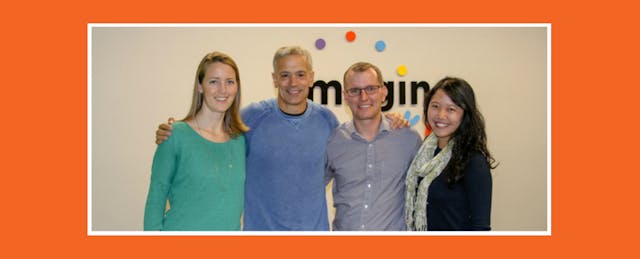Imagine K12, the accelerator that sparked both edtech startups and other incubators, is merging with that granddaddy of accelerators, Y Combinator. Instead of a standalone entity, the program will be known as: "YC/Imagine K12."
Since it began in 2011, Imagine K12 has launched 81 companies—and helped catalyze more than a dozen other accelerators and incubators exclusively devoted to education technology. Its founders—Tim Brady, Geoff Ralston and Alan Louie (who has since left the program)—have coached startups on both the complexities of starting a company as well as on the nuances of the education world.
By combining forces with YC, Brady, Ralston and two other colleagues hope that YC will support companies on the skills involved in running a company, freeing them up to spend more time on issues specific to the education technology space.
“We want the next generation of edtech companies to have the greatest possible impact,” says Brady. “We’ve just improved the chances that [our edtech companies] will raise funding,” adds Ralston, by combining with YC, which hosts a famed “Demo Day” at the conclusion of its startup cohorts. These launch events for its companies draw a packed house of investors twice a year. “It’s a ‘vast superset’ of investors,” Ralston says.
The Imagine K12 founders say that as many as 60 percent of the companies they’ve hosted have raised independent capital, totaling investments of about $200 million. Eighty-one percent of its startups are still operating. By contrast, about 75 percent of YC’s companies—a larger, older and more diverse pool—are estimated to be still operating.
“I’m delighted,” says Sam Altman, President of Y Combinator. “We’ve been talking about this for a while.”
The integration will happen with the next batch of startups. The enrollment process for YC/Imagine K12 is open now and all applications are due by March 24. (Check out details about the application here.) Accepted companies will start their three-month program in June. And there will be another cohort later in the year.
Imagine K12 and Y Combinator have always been close: When Brady, Ralston and Louie launched Imagine K12 in 2011, they got a “playbook” and earful of advice on running an accelerator from YC co-founder, Paul Graham. The co-founders funded the program and continued to invest $20K apiece in each of the startups.
In 2013, they raised a $4 million fund, which enabled them to provide an additional $80K investment for each company. Contributors to that fund included YC’s Graham, along with other Silicon Valley investors excited about education ventures—Yahoo co-founder David Filo, Angela Filo, LinkedIn CEO Jeff Weiner, Chegg CEO Dan Rosensweig, NewSchools Venture Fund and GSV Asset Management among them.
Three years later, that fund has been fully invested. And rather than raise another fund, the timing seemed right to fuse Imagine K12 with Y Combinator, say the founders. “The edtech ecosystem is more mature,” Brady observes. By including edtech companies in YC, they will benefit from the broad business advice that YC provides—as well as get additional, education-specific coaching from Brady, Ralston and their team.
All four of the current Imagine K12 team, including founding partners Geoff Ralston and Tim Brady, plan to continue their work under the YC/Imagine K12 banner. Brady and Ralston plan to bolster the “alumni” network edtech companies, including both Imagine K12 grads as well as edtech companies that emerged from YC.
Y Combinator has a long history of nurturing startups in verticals where investor interest is scarce and helping build investor momentum over time, Altman says. (For instance, it already has a hardware and a biotech vertical.) Even so, edtech companies have represented only a sliver of YC’s portfolio in the past—perhaps 20 to 30 companies from the 1,100 that YC has spawned, Altman says. (Among them: Clever and Panorama Education.)
Both the Imagine K12 team and Altman say they are confident that edtech companies are ready to compete among other startups for funding. And those companies may not be exclusively serving K-12 schools. “Our heart is in K-12,” Brady says, yet even now, the team can get excited about technologies that serve students in a broader age range.
“I’m pretty confident that we can find and advise good edtech startups,” says Altman.


